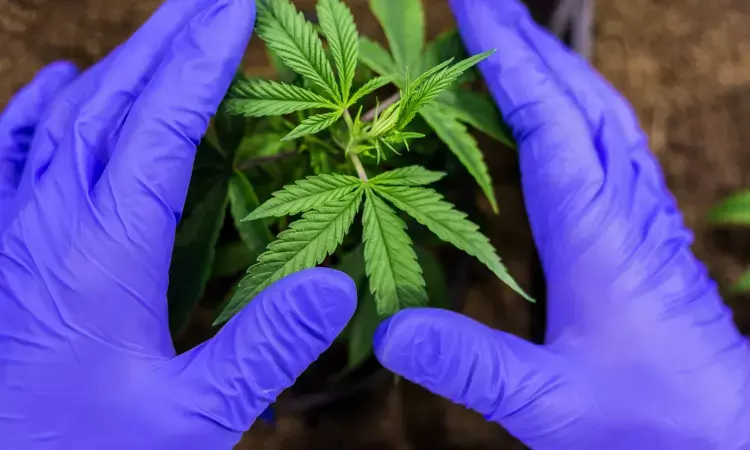- Home
- Medical news & Guidelines
- Anesthesiology
- Cardiology and CTVS
- Critical Care
- Dentistry
- Dermatology
- Diabetes and Endocrinology
- ENT
- Gastroenterology
- Medicine
- Nephrology
- Neurology
- Obstretics-Gynaecology
- Oncology
- Ophthalmology
- Orthopaedics
- Pediatrics-Neonatology
- Psychiatry
- Pulmonology
- Radiology
- Surgery
- Urology
- Laboratory Medicine
- Diet
- Nursing
- Paramedical
- Physiotherapy
- Health news
- Fact Check
- Bone Health Fact Check
- Brain Health Fact Check
- Cancer Related Fact Check
- Child Care Fact Check
- Dental and oral health fact check
- Diabetes and metabolic health fact check
- Diet and Nutrition Fact Check
- Eye and ENT Care Fact Check
- Fitness fact check
- Gut health fact check
- Heart health fact check
- Kidney health fact check
- Medical education fact check
- Men's health fact check
- Respiratory fact check
- Skin and hair care fact check
- Vaccine and Immunization fact check
- Women's health fact check
- AYUSH
- State News
- Andaman and Nicobar Islands
- Andhra Pradesh
- Arunachal Pradesh
- Assam
- Bihar
- Chandigarh
- Chattisgarh
- Dadra and Nagar Haveli
- Daman and Diu
- Delhi
- Goa
- Gujarat
- Haryana
- Himachal Pradesh
- Jammu & Kashmir
- Jharkhand
- Karnataka
- Kerala
- Ladakh
- Lakshadweep
- Madhya Pradesh
- Maharashtra
- Manipur
- Meghalaya
- Mizoram
- Nagaland
- Odisha
- Puducherry
- Punjab
- Rajasthan
- Sikkim
- Tamil Nadu
- Telangana
- Tripura
- Uttar Pradesh
- Uttrakhand
- West Bengal
- Medical Education
- Industry
Field sobriety tests display insufficient accuracy for detecting THC-specific driving impairment

An Original Investigation by Marcotte et al. and team, "Evaluation of Field Sobriety Tests for Identifying Drivers Under the Influence of Cannabis A Randomized Clinical Trial", published in JAMA Psychiatry has said that in our study, officers classified a significantly higher proportion of participants as Field Sobriety Tests (FSTs) impaired in the THC (tetrahydrocannabinol) group versus the placebo group at 3 of 4-time points measured after smoking.
What is the accuracy of FSTs in identifying THC impairment? With increasing medicinal and recreational cannabis legalization, there is a public health need for effective and unbiased evaluations to determine whether a driver is impaired due to THC exposure. Though FSTs are a vital component of the gold standard law enforcement officer–based evaluations, more research must be conducted to determine their efficacy in detecting whether a person is under the influence of THC.
The critical points of the study are:
- The trial location was the Center for Medicinal Cannabis Research, University of California, San Diego.
- There were 117 men and 67 women. The adults were aged 21-55 years with cannabis use greater than or equal to 4 times in the past months. The mean age of participants was 30 years.
- A total of 184 participants were analyzed.
- Participants were randomized 1:1:1 to placebo, THC cannabis and THC cannabis smoked ad libitum.
- The primary endpoint was the law enforcement officer's determination of FST impairment at four-time points after smoking.
- One hundred twenty-one participants received THC, and 63 received a placebo.
- Officers classified 98 and 31 participants in the THC and placebo group as FST impaired at 70 minutes after smoking.
- The THC group performed significantly worse on 8 of 27 individual FST components (29.6%) and all FST summary scores compared to the placebo.
- Out Of 128 participants classified as FST impaired, officers suspected 127 (99.2%) as having received THC.
- There was a significant association between Driving simulator performance and with results of select FSTs.
Further reading:
Marcotte TD, Umlauf A, Grelotti DJ, et al. Evaluation of Field Sobriety Tests for Identifying Drivers Under the Influence of Cannabis: A Randomized Clinical Trial. JAMA Psychiatry. Published online August 02, 2023. doi:10.1001/jamapsychiatry.2023.2345
BDS, MDS in Periodontics and Implantology
Dr. Aditi Yadav is a BDS, MDS in Periodontics and Implantology. She has a clinical experience of 5 years as a laser dental surgeon. She also has a Diploma in clinical research and pharmacovigilance and is a Certified data scientist. She is currently working as a content developer in e-health services. Dr. Yadav has a keen interest in Medical Journalism and is actively involved in Medical Research writing.
Dr Kamal Kant Kohli-MBBS, DTCD- a chest specialist with more than 30 years of practice and a flair for writing clinical articles, Dr Kamal Kant Kohli joined Medical Dialogues as a Chief Editor of Medical News. Besides writing articles, as an editor, he proofreads and verifies all the medical content published on Medical Dialogues including those coming from journals, studies,medical conferences,guidelines etc. Email: drkohli@medicaldialogues.in. Contact no. 011-43720751


